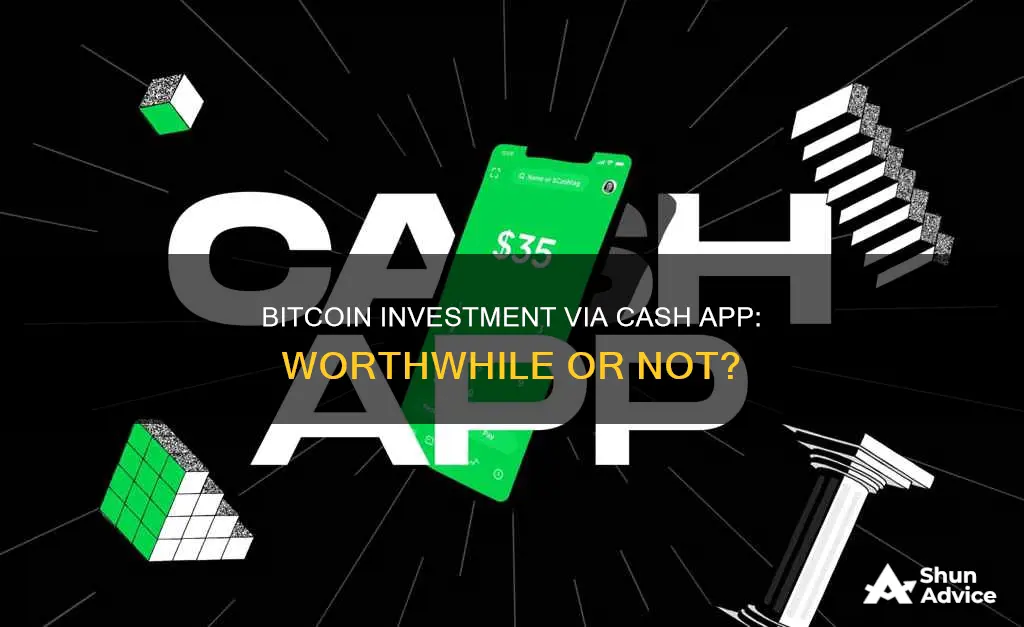
Cash App is a peer-to-peer money transfer app that allows users to buy, sell, store, send, and receive Bitcoin. It is a beginner-friendly platform for users who want to invest in Bitcoin, as it is easy to use and navigate. However, it is important to note that Cash App only offers Bitcoin and no other cryptocurrencies. Additionally, the fees associated with buying and selling Bitcoin on Cash App are not transparent and can be relatively high, especially for purchases of $100 or less. While Cash App takes precautions to ensure the safety of its users' Bitcoin, there is a risk of data breaches and hacking, as highlighted by an incident in 2022. Therefore, users considering investing in Bitcoin through Cash App should carefully evaluate the benefits and drawbacks before making a decision.
| Characteristics | Values |
|---|---|
| Ease of use | User-friendly, simple to buy, sell, send and receive Bitcoin |
| Security | Cold storage, PCI Data Security Standard (PCI-DSS) Level 1 compliant, advanced encryption and fraud detection technology |
| Fees | Fees are not transparent, above 2% on purchases of $100 or less, fees drop for larger purchases |
| Other cryptocurrencies | Only Bitcoin is available |
| Educational resources | Limited educational tools about Bitcoin |
What You'll Learn

Bitcoin on Cash App: ownership and security
Bitcoin is the only cryptocurrency available to purchase on the Cash App platform. The app acts as a bitcoin wallet, allowing users to view their BTC balance and buy or sell at any time. Cash App also securely stores the private keys for your bitcoin, so you can access it instantly.
Ownership
Cash App functions as a custodial wallet for any BTC purchased on the app, meaning you can keep your Bitcoin stored within the application itself. However, you also have the option to transfer your Bitcoin to any other crypto wallet.
Security
Cash App helps keep your bitcoin safe by using a secure, cold storage solution. The app is built on a secure platform, with advanced security features to protect your personal information and transactions. It uses cutting-edge encryption and fraud detection technology to ensure your data and money are secure.
Additionally, if you have a Cash App Card, the money in your Cash App account balance is covered by FDIC insurance through their partner banks. The FDIC will cover eligible accounts up to $250,000 per Cash App customer. However, it is important to note that Bitcoin and investing balances are not covered by this insurance.
Gold Coin Commemoratives: Worthy Investment or Worthless?
You may want to see also

Cash App's Bitcoin operations
Cash App is a peer-to-peer money transfer app, comparable to Venmo or PayPal, that allows users to buy, store, send, and receive Bitcoin. It is a straightforward platform for users to buy Bitcoin, but it is limited in that it only allows users to buy and sell Bitcoin.
To purchase Bitcoin on Cash App, users must first create an account and link it to their checking or savings account. They can then go to the ''Buy Bitcoin' screen and finalise their purchase. Cash App fees vary based on transaction size and are built into the purchase price. The app also includes a spread, meaning users pay slightly more than the market value for Bitcoin and sell for slightly below market value. Additional fees also apply for withdrawals with expedited settlements.
Cash App allows users to instantly send or receive Bitcoin when transacting with other Cash App users. To send Bitcoin, users need the recipient's username on the app, referred to as a $Cashtag. Users can also transfer their Bitcoin to a cryptocurrency wallet.
Cash App acts as a custodial wallet for any BTC purchased on the app, allowing users to keep their Bitcoin stored within the application. Cash App also allows users to transfer Bitcoin to any crypto wallet. Storing Bitcoin in a separate wallet is generally a more secure option, as institutions that handle transactions or store cryptocurrency can be a common target for hackers.
To sell Bitcoin using the Cash App, users go to the Bitcoin tab on the application, select "Sell", and enter the amount they wish to sell. They then need to enter their PIN or touch ID to confirm the transaction.
Cash App is a user-friendly platform for buying Bitcoin, but it does have some potential drawbacks. These include a lack of transparency around fees, the fact that it only offers Bitcoin, and the simple platform, which may not offer enough educational resources for those looking to get serious about cryptocurrencies.
How to Send Bitcoin Using Circle Invest
You may want to see also

Pros and cons of using Cash App to buy Bitcoin
Cash App is a peer-to-peer money transfer app that allows users to buy, hold, send, receive, and sell Bitcoin. It is a straightforward alternative to a crypto exchange, but it only allows the buying and selling of Bitcoin. Here are the pros and cons of using Cash App to buy Bitcoin:
Pros
- Cash App is user-friendly, and it is easy to buy Bitcoin through the app.
- It is simple to send Bitcoin to other people or to another Bitcoin wallet.
- Cash App offers Lightning Network, which allows users to send Bitcoin globally without any fees.
- Cash App provides a secure, cold storage solution to keep your Bitcoin safe.
- Cash App is PCI Data Security Standard (PCI-DSS) Level 1 compliant, ensuring that your payment information is encrypted and sent securely.
- Cash App allows you to withdraw your Bitcoin at any time and choose the speed of your withdrawal.
- You own 100% of your Bitcoin on Cash App, and the platform does not lend out your Bitcoin to others.
- Cash App provides a custodial wallet for your BTC, allowing you to view your balance and buy or sell at any time.
- Cash App is built on a secure platform with advanced security features to protect your personal information and transactions.
- Cash App accounts are FDIC-insured through partner banks, covering eligible accounts up to $250,000 per customer.
Cons
- Cash App charges fees for buying and selling Bitcoin, and these fees are not transparent, as there is no published fee schedule.
- Cash App only offers Bitcoin, while other app-based platforms offer multiple cryptocurrencies.
- The Cash App platform is simple, with limited educational tools about Bitcoin and cryptocurrencies.
- Cash App accounts are a popular target for hackers, and there was a data breach in 2022 where hackers accessed accounts and stole funds.
- Cash App has higher crypto trading fees than other platforms like Coinbase, and these fees are typically above 2% on purchases of $100 or less.
- When selling Bitcoin, you are responsible for determining the tax impact of your transactions, as Cash App does not provide tax advice.
VCs' Big Bet on Bitcoin
You may want to see also

Cash App vs Coinbase: fees, cryptos available, wallets, security
Cash App and Coinbase are two major players in the dynamic world of cryptocurrency exchanges, each offering unique features and services.
Fees
Coinbase has lower crypto trading fees than Cash App, which is an important advantage if you're planning to invest in cryptocurrency regularly. Cash App doesn't publish its fee structure, but fees are normally above 2% on purchases of $100 or less. Fees on Coinbase vary depending on whether you use its simple trading or advanced trading option. The advanced trading tool is the best deal, with fees ranging from 0% to 0.60%.
Cryptos Available
Coinbase has a massive advantage over Cash App when it comes to the selection of cryptocurrencies available. Coinbase offers well over 150 different cryptocurrencies and regularly adds new ones. Cash App, on the other hand, only offers Bitcoin.
Wallets
Both Cash App and Coinbase have custodial wallets where you can send and receive crypto using your wallet address. Coinbase also offers a non-custodial wallet, Coinbase Wallet, which can be used to store both cryptocurrencies and other digital assets such as non-fungible tokens (NFTs).
Security
Both Cash App and Coinbase are considered safe places to buy and sell crypto. Coinbase offers insurance and keeps most cryptocurrency offline in cold storage, making it harder to steal. Cash App uses cutting-edge encryption and fraud detection technology to protect user data and money. It also offers a secure, cold storage solution for Bitcoin.
A Beginner's Guide: Investing in Bitcoin Gold in India
You may want to see also

Bitcoin as an investment: risks and taxes
Risks
Bitcoin is a popular investment vehicle, but it comes with a unique set of risks that investors should be aware of. One of the primary risks is its volatile nature; Bitcoin's price can fluctuate dramatically, and there is no guarantee that it will recover after a drop. For example, its price fell by nearly 11% over 24 hours after hitting an all-time high.
Additionally, there is the risk of losing access to your Bitcoin if you lose your account passwords or private keys. The methods for storing and accessing Bitcoin can be complex and are prone to security issues. There is also the possibility of scams and fraudulent activity in the cryptocurrency space, with no insurance to safeguard investors against losses due to hacks or failures on exchanges.
Regulation is another concern. Central banks may establish their own digital currencies, potentially replacing Bitcoin and other cryptocurrencies. The environmental impact of Bitcoin mining has also drawn scrutiny from governments, with China taking aggressive steps to shut down mining operations.
Taxes
Bitcoin is taxed, and the specifics depend on the jurisdiction. In the United States, the Internal Revenue Service (IRS) treats Bitcoin as an asset similar to property for tax purposes. Retail transactions using Bitcoin are subject to capital gains tax, and mining businesses can make business deductions for their equipment. Any gains or losses from sales must be reported, and the tax rate depends on the duration of ownership and total income for the year. It's important to maintain careful records of transactions and fair market values to comply with tax regulations.
Bitcoin Investment: Safe or Risky Bet?
You may want to see also
Frequently asked questions
Cash App is a user-friendly and safe platform to buy, store, send, and receive Bitcoin. It is a beginner-friendly app that allows you to buy Bitcoin easily and securely. Cash App also offers the Lightning Network, allowing you to send Bitcoin globally for free.
Yes, there are a few potential drawbacks. Cash App only offers Bitcoin, while other similar apps offer multiple cryptocurrencies. It also charges fees for buying and selling Bitcoin, and these fees are not transparent, as there is no published fee schedule. Additionally, Cash App has limited educational resources about Bitcoin compared to other platforms.
Cash App takes precautions to ensure your Bitcoin is secure. It is PCI Data Security Standard (PCI-DSS) Level 1 compliant, and your payment information is encrypted and securely sent to their servers, regardless of the internet connection you use. Cash App also uses cold storage for the majority of Bitcoin storage, keeping it offline and disconnected from the internet to protect your funds from online threats.
Yes, you can withdraw your Bitcoin from Cash App at any time. Cash App allows you to transfer your Bitcoin to other apps, exchanges, wallets, or custody solutions. You can even choose the speed of your withdrawal, with options for Standard, Rush, and Priority.







